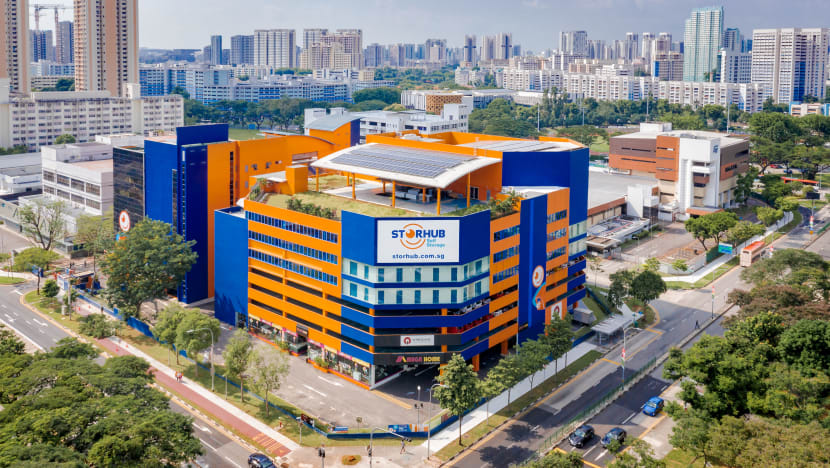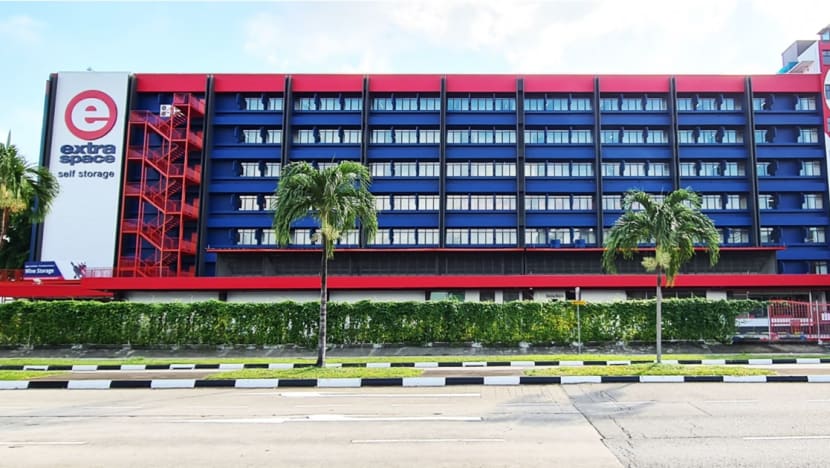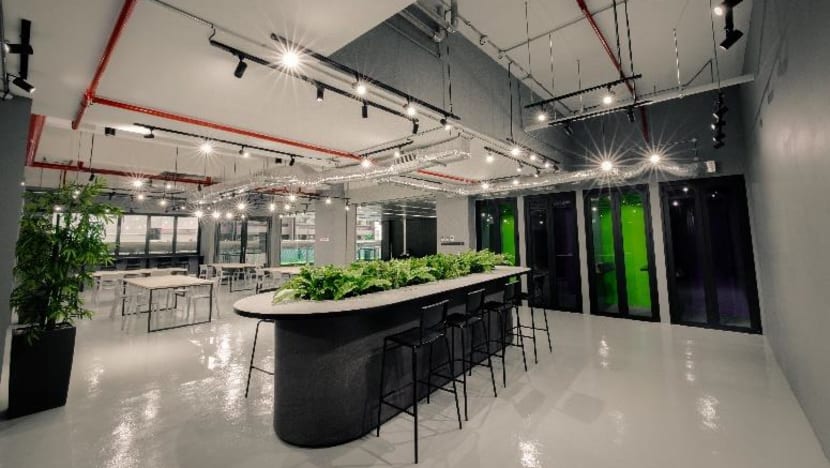Self-storage operators see brisk business amid COVID-19 pandemic

To ride on demand, StorHub Self Storage opened two facilities in Singapore this year and plans to launch another two early next year. (Photo: StorHub Self Storage)
SINGAPORE: Self-storage providers are seeing a boom in demand due to the COVID-19 pandemic, with some already expanding their operations in Singapore.
Enquiries and take-up rates for these spaces, which people and businesses rent to store personal items or inventory, have jumped, five providers told CNA.
More people are realising they need additional space at home for remote working and for new hobbies, providers said. Demand is also rising from businesses rethinking office space needs or stocking up on goods to guard against supply chain disruptions.
That said, demand did plummet during Singapore's "circuit breaker" last year. Lock+Store's chief executive Helen Ng said enquiries fell by 90 per cent between April and June last year.
But things picked up soon after the country exited the lockdown. Enquiries from individuals have since risen by 30 per cent and by 20 per cent from businesses – one-third of these individuals and half of these businesses eventually took up storage spaces, Ms Ng said.
Lock+Store, which has 12 facilities across Singapore, has expanded its capacity at three popular locations.
StorHub Self Storage, which was the first such operator here back in 2003, said its sales have grown more than 35 per cent since the start of 2020, along with a 110 per cent jump in enquiries. It opened two new locations this year, taking its number of facilities in Singapore to 13.
COVID-19 has "changed the rules of the game", said the company's Singapore CEO Luigi La Tona. “People used to see self-storage as a nice-to-have. It’s now a need-to-have.”
Work+Store, which launched its 10th storage facility here in August, said take-up rates by individuals and businesses have increased by 10 per cent and 50 per cent, respectively, when compared with pre-pandemic days.
Over at Extra Space Asia, enquiries and take-up rates rose by about 30 to 40 per cent since early last year, with demand from businesses “being slightly higher”. The overall occupancy rate across its 11 locations now stands at 93 per cent, up from 87 per cent in 2019 before COVID-19 hit.
“The pandemic has not affected our business as storage is essential for many, be it for personal use or business use, although the reasons for needing storage have changed slightly,” said chief executive Kenneth Worsdale.

WHAT’S DRIVING DEMAND?
Self-storage spaces were already gaining popularity due to various factors such as scarcity of space in smaller homes, industry players said. But the shift to working from home has spurred more to seek out additional storage to put away bulky furniture and unused items like luggage.
“Being encouraged to work from home, people hope to recreate that ergonomic environment they had in their offices with a proper desk and chair, and that takes space. If that’s the case, things that you may only need every once in a while will be going into storage,” said Mr La Tona.
People are also decluttering their homes to fit new pandemic hobbies – cooking and baking equipment, bicycles, golf clubs and wine – Mr La Tona said StorHub has seen a near 200 per cent increase in demand for its wine storage facilities.
There is also steady demand from home owners affected by delays in renovation works and completion of new housing projects. Some foreigners who visited their home countries and found themselves unable to return to Singapore due to changing border restrictions have also turned to self-storage spaces.
“Many have had to store their belongings with us either temporarily or for longer periods (like) more than six months,” said Lock+Store's Ms Ng.
For business users, the demand stems from a combination of reasons such as companies having to resize to cope with pandemic-related uncertainties and the accelerated growth in e-commerce.
For instance, the cycling boom has seen new bicycle shops spring up on e-commerce platforms. These businesses are renting spaces to store and assemble their bicycles, said Store-Y, a self-storage operator set up by Far East Organization’s Agape Business Group.
Storage providers said businesses, especially new and small enterprises, are attracted to their offerings of varying storage areas at low prices, flexible leases that can be as short as a month and 24/7 access. This is unlike warehouses that only offer a fixed space and longer leasing contracts.
“They may choose to upsize, downsize or even extend if they need to. Also, the ability to access their storage unit any time of the day is highly convenient for their business needs,” said Extra Space Asia's Mr Worsdale.
Global supply chain snarls have also prompted many businesses to stock up well ahead of the year-end festive season. They have similarly turned to self-storage providers due to flexible, short-term leases, Work+Store CEO Danny Wong said.
Also requiring storage options are businesses that have had to downsize or close amid the pandemic.
“These storers are often unable to dispose their assets and do not want to throw them away in the hope that they may be able to begin business again once there is more certainty in the economic future,” Mr Worsdale said.
STAYING AHEAD OF COMPETITION
Amid optimism about the industry's outlook, self-storage operators have either embarked on or are mulling further expansion plans in Singapore.
StorHub opened two facilities this year in Kallang and Yishun, and will open another two in Serangoon and Toh Guan in the first quarter of next year.
“Taken together, it’s going to be close to 300,000 sqft of space that we will have opened in just a year,” said Mr La Tona. “Why? Because the demand is there and the demand continues to increase.”
Brisk business in the self-storage industry will add to demand for industrial properties, which has been “generally resilient” amid the pandemic, said Ms Alice Tan, head of consultancy at Knight Frank Singapore.
With the robust demand, industrial space in choice locations – near residential areas or with convenient transport options – has fallen. But there are still industrial properties with under-utilised space, which can be used for self-storage facilities, she said.
Operators are also getting creative to stay ahead of the competition.
Work+Store’s newest outlet in Kallang Bahru offers additional facilities like photography and live-streaming studios, a pantry, a packing area, as well as a pick-up and return centre. The subsidiary of LHN Group also recently teamed up with logistics firm J&T Express to offer its storage users last-mile delivery services.
“We created these based on observations of our users and their requirements,” said CEO Mr Wong. Many of its business users are micro-SMEs that use storage units for packing and inventory checks, he added.
“We noticed that they often spend three to four hours in their units … so we also decided to provide a pantry area which can double up as meeting spaces with suppliers,” he added.

At Extra Space Asia, those who sign up for its “executive storage” plan can get access to a round-the-clock co-working space. These are usually entrepreneurs and small business owners who need office space along with access to their inventory, the firm said.
StorHub also said it has a new lifestyle concept, which it described as a “higher-end” offering with digital locks, premium security and communal areas. This is currently only available at its Toa Payoh facility.
With digitalisation a priority amid the pandemic, other new initiatives in the works by various self-storage operators include offering virtual tours and smartphone apps for users.
Knight Frank, in a report dated May 2020, had urged self-storage operators to leverage technology to differentiate themselves.
For example, they can analyse data from bookings or tap facial recognition software to heighten surveillance and the security of storage facilities, Ms Tan told CNA.
So far, the industry’s technological offerings have remained “fairly fundamental”, likely due to cost considerations. Local users are also “not demanding”, she added.
“But who knows, maybe a self-storage player can set the trend of using facial recognition as user authentication … and the industry will pivot as a whole, which (will then be seamless) with Singapore’s overall digital infrastructure strategy,” said Ms Tan.
















